AI Revolution: Job Risks and Investment Opportunities Ahead

Geoffrey Hinton's Insights on AI's Impact on Employment
Nobel laureate Geoffrey Hinton, recognized as the "Godfather of AI," has raised alarms about the growing trend of artificial intelligence (AI) leading to significant job losses. He asserts that tech companies are focusing on maximizing profits through the replacement of human labor with intelligent systems. This phenomenon has immense implications for the workforce and the economy.
Significant Increase in AI Investment
Major tech companies are ramping up their capital expenditures to implement AI-driven solutions. Reports indicate that leading firms, such as Microsoft Corp. (NASDAQ: MSFT), Meta Platforms Inc. (NASDAQ: META), Alphabet Inc. (NASDAQ: GOOG), and others, are poised to elevate their AI investments to approximately $420 billion in the upcoming fiscal year. This represents a substantial rise from the $360 billion spent in the current year.
Job Openings Decline Amidst AI Adoption
According to Hinton, the launch of OpenAI's ChatGPT has coincided with a notable 30% drop in job openings. This trend is mirrored by the actions of companies like Amazon, which has announced significant layoffs, including 14,000 positions primarily in middle management. Hinton expressed that to ensure profitability, businesses may feel compelled to eliminate human roles entirely.
The Dichotomy of Productivity Gains Versus Job Security
Hinton posits that the core issue surrounding AI does not solely revolve around the technology itself, but rather the broader societal structures governing its implementation. He foresees a future where AI creates unprecedented productivity gains, particularly in sectors like healthcare and education. Nonetheless, the concern remains that these advancements might lead to "massive unemployment" and exacerbate profit margins for companies at the expense of the workforce.
Recent Senate Report on Job Risks
Hinton's concerns are echoed in a report from the Senate that cautions about the potential loss of close to 100 million jobs in the United States over the next decade due to advancements in automation and AI technologies. The report highlights a critical need to ensure that workforce benefits accompany these technological innovations rather than it being disproportionately advantageous to wealthy shareholders.
Future Outlook on AI’s Role in Society
The rapid acceleration of AI technologies poses important questions about the future labor market. The convergence of AI and significant capital investment from prominent firms urges a re-evaluation of labor dynamics. As investments surge, understanding the broader implications for job opportunities becomes central to discussions around ethical AI development and implementation.
Investor Perspectives
Investor Chamath Palihapitiya, however, has expressed skepticism about solely attributing job losses to AI advancements. He argues that the issues faced by companies like Amazon may stem more from organizational inefficiencies rather than the technology itself. This perspective suggests a more nuanced view of the interplay between technology and labor market trends, opening discussions for strategic adjustments in workforce development.
Addressing the Challenges Ahead
With the substantial financial backing that AI ventures receive from industry giants, it is essential for stakeholders to consider the socio-economic impact of these innovations. As AI systems become more integrated into various industries, there needs to be proactive measures to address potential job displacement and a strategy to safeguard and enhance employment opportunities.
Frequently Asked Questions
What are Geoffrey Hinton's main concerns about AI?
Hinton warns that AI may lead to widespread job replacements as companies seek to maximize profits, fundamentally altering the employment landscape.
How much are tech companies investing in AI?
Leading tech firms are expected to increase their AI investments to about $420 billion next fiscal year, demonstrating a significant commitment to advancing AI solutions.
What impact has AI had on job openings?
Since the introduction of AI models like OpenAI's ChatGPT, job openings have reportedly decreased by around 30%, indicating a concerning trend in the labor market.
What does the Senate report say about AI and jobs?
The Senate report warns that automation and AI could result in the loss of nearly 100 million jobs in the United States in the next decade, emphasizing a need for thoughtful workforce transition strategies.
What is the role of investors in this AI landscape?
Investors are scrutinizing AI developments as companies navigate efficiency improvements versus employee layoffs. Diverse opinions exist regarding the roots of job declines amid these advancements.
About The Author
Contact Kelly Martin privately here. Or send an email with ATTN: Kelly Martin as the subject to contact@investorshangout.com.
About Investors Hangout
Investors Hangout is a leading online stock forum for financial discussion and learning, offering a wide range of free tools and resources. It draws in traders of all levels, who exchange market knowledge, investigate trading tactics, and keep an eye on industry developments in real time. Featuring financial articles, stock message boards, quotes, charts, company profiles, and live news updates. Through cooperative learning and a wealth of informational resources, it helps users from novices creating their first portfolios to experts honing their techniques. Join Investors Hangout today: https://investorshangout.com/
The content of this article is based on factual, publicly available information and does not represent legal, financial, or investment advice. Investors Hangout does not offer financial advice, and the author is not a licensed financial advisor. Consult a qualified advisor before making any financial or investment decisions based on this article. This article should not be considered advice to purchase, sell, or hold any securities or other investments. If any of the material provided here is inaccurate, please contact us for corrections.
